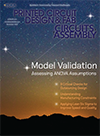NPL: Creep Rates Affect Pb-Free Joint Testing
Teddington, UK –The National Physical Laboratory (NPL) has created a method for generating materials data from lead-free solder joints under shear with geometries and dimensions mirroring those used in current assembly technology. Such data is important for future FEA modelling.
Lead-free solder does not behave in the same way as lead-containing solder under accelerated thermocycling testing. In particular, the joint is in shear whereas creep data have traditionally been obtained under tensile conditions. This is complicated by the decreasing volume of solder used in electronics interconnection.
The new test method and FEA analysis have confirmed that the dominant mode of solder joint deformation in the test piece is the desired shear mode. The results highlight the importance of primary creep, which must be included in modelling of lead-free solder fatigue.
Stress relaxation is an alternative approach in generating relevant, credible material properties for low cycle fatigue by estimating the actual stress in solder joints as a function of time. When obtaining data from micro-sized joints, the method takes account of primary creep, is relatively quick and also useful when estimating stress in solder joints during thermal cycling temperature dwells. Using the test method, the performances of Sn3,5Ag, Sn3.8Ag0.7Cu and Sn37Pb solders were evaluated during creep and stress relaxation as the basis for an efficient fatigue test and a source of data for FEA modelling purposes.
The differences between the secondary creep rates of SnAg and SnAgCu alloys are only marginal. However, the secondary creep rate of SnAgCu or SnAg can exceed that of SnPb at stresses above a shear stress of 20 MPa. Below this level, SnPb solder creeps faster. Thus the calculations of acceleration factors, as well as the temperature test profiles, have to be modified to match service conditions.
The report, DEPC MPR 02,1 can be viewed here: www.npl.co.uk/ei/
Press Releases
- Strong signal for the industry: productronica 2025 drives positive industry trend
- Sharpen Your ESD Skills: CE3S Announces Desco’s First ANSI/ESD S20.20 Training Series for 2026
- Mycronic Secures Turnkey Solution Order from a Nordic Defense Actor
- Altus Partners with Sellectronics to Enhance Manufacturing Capabilities with PVA Delta 8 System







